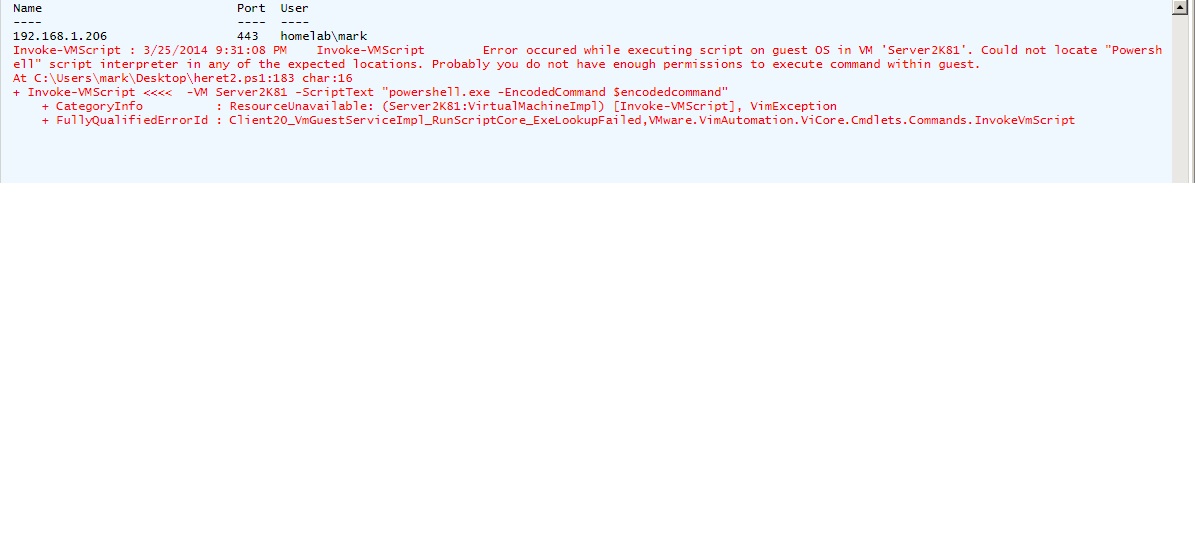The Invoke-Expression method I have works locally, but not through Invoke-VMScript.
Below i tried to use the encodedcommand method and I am getting the error where it says it can't find the PowerShell interpreter.

Add-PSSnapin VMware.VimAutomation.Core
Connect-VIServer -Server 192.168.1.206
$command2 = {
$sc1 = @'
function remove-profile {
[cmdletbinding(
SupportsShouldProcess = $true,
ConfirmImpact="High"
)]
param(
[string[]]$computername="localhost",
[validaterange(0,9999)][int]$days = 1,
[string[]]$exceptions = $null,
[string[]]$profiles = $null
)
#function to get profiles
function Get-Profile {
[cmdletbinding()]
param(
[string]$computername,
[string[]]$exceptions = $null,
[string[]]$profiles = $null
)
#function to convert array of strings into regex for paths to avoid
function build-Regex {
param([string[]]$items)
$( foreach($item in $items){ "^$item$" } ) -join "|"
}
$date = get-date
#test connection
if(Test-Connection -ComputerName $computername -BufferSize 16 -count 2 -Quiet){
#Check OS
Try{
$opSys = Get-WmiObject Win32_OperatingSystem -computername $computername | select -ExpandProperty version
}
Catch{
Throw "Error: Could not obtain OS version WMI information from $computername"
Return
}
#Find XP profiles
if ($opSys –like “5*”) {
#define property that we will use to test exceptions / profile regexs against
$property = "fullname"
#get all profiles on computer using file system
$allProfiles = Get-Childitem "\\$computername\c$\documents and settings\" -force | ?{$_.PSIsContainer}
}
#Find Vista + profiles
if ($opSys –like “6*”) {
#define property that we will use to test exceptions / profile regexs against
$property = "localpath"
Try{
#get all profiles on computer using WMI
$allProfiles = get-wmiobject -computername $computername -class win32_userprofile | ?{ $_.localpath -like "C:\users\*" }
}
Catch{
Throw "Error gathering profile WMI information from $computername. Be sure that WMI is functioning on this system and that it is running Windows Vista or Server 2008 or later"
Return
}
}
#if specified, filter for profiles
if($profiles){
#build regex using provided profiles
$profileRegex = build-Regex $profiles
#test profiles against profiles regex
$allProfiles = $allProfiles | ?{ $(split-path $_.$property -leaf) -match $profileRegex }
}
#if specified, filter exceptions
if($exceptions){
#build regex using provided exceptions
$exceptionsRegex = build-Regex $exceptions
#test profiles against exceptions regex
$allProfiles = $allProfiles | ?{ $(split-path $_.$property -leaf) -notmatch $exceptionsRegex }
}
#Return results
$allProfiles
}
else{
Throw "Could not connect to $computername"
Return
}
}
#Get date for profile last access comparison
$date = get-date
#Add standard accounts to exclude unless explicitly instructed not to
if( -not $DontExcludeStandardAccounts ){
$exceptions += "Administrator", "LocalService", "NetworkService", "All Users", "Default User"
}
#loop through provided computers
foreach($computer in $computername){
#get all the profiles for this computer
$profilesToRemove = Get-Profile -computername $computer -exceptions $exceptions -profiles $profiles -ErrorAction stop
#if none returned, throw an error and move on to the next computer
if(-not $profilesToRemove){
Write-Error "Error: No profiles returned on $computer"
Continue
}
#Get-Profiles returns a directoryinfo object for XP, use this to determine OS.
if($profilesToRemove[0] -isnot [System.IO.DirectoryInfo]){ $opsys = 6 }
else{ $opsys = 5 }
#loop through profiles
foreach($profile in $profilesToRemove){
#Define path and last access time for profile
if($opsys -eq 6){
#Windows 7: convert localpath to remote path remote path. Currently only handling profiles on C drive
$path = $profile.localpath.replace("C:","\\$computer\C$")
$lastAccess = ([WMI]'').ConvertToDateTime($profile.LastUseTime)
}
else{
#Windows XP: define path
$path = $profile.fullname
$lastAccess = $profile.lastWriteTime
}
#Confirm we can reach $path
Try {
get-item $path -force -ErrorAction stop | out-null
}
Catch{
#if we couldnt get the item, display an error and move on to the next profile
Write-Error "Error: Could not get-item for $path"
Continue
}
#If the profile is older than the days specified, remove it
if($lastAccess -lt $date.AddDays(-$days)){
#-confirm and -whatif support
if($pscmdlet.shouldprocess("$path last accessed $lastAccess")){
#build results object
$tempResult = "" | Select ComputerName, Path, lastAccess, Status
Try{
if($opsys -eq 6){
#Windows Vista+: remove the profile using WMI
$profile.delete()
}
else{
#Windows XP: remove the profile using file system
Remove-Item $path -force -confirm:$false -recurse
}
#Add properties to results object
$tempResult.ComputerName = $computer
$tempResult.Path = $path
$tempResult.LastAccess = $lastAccess
$tempResult.Status = "No error"
}
Catch{
#add properties to results object
$tempResult.ComputerName = $computer
$tempResult.Path = $path
$tempResult.LastAccess = $lastAccess
$tempResult.Status = "Error removing profile"
#WMI delete method or file removal failed. Write an error, move on to the next profile
Write-Error "Error: Could not delete $path last accessed $lastAccess"
Continue
}
#display result
$tempResult
}
}
}
}
}
remove-profile -days 0 -computername localhost -profiles AAFNCRRHOBXXJI -confirm:$false
'@
Invoke-Expression $sc1
}
$command3 = "ipconfig"
$bytes2 = [System.Text.Encoding]::Unicode.GetBytes($command2)
$encodedcommand = [Convert]::Tobase64String($bytes2)
Invoke-VMScript -VM Server2K81 -ScriptText "powershell.exe -EncodedCommand $encodedcommand"
Read-Host "ok"